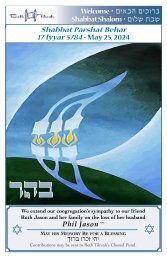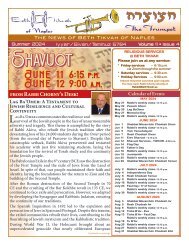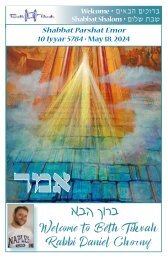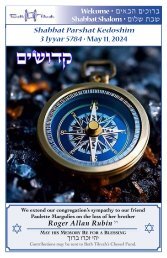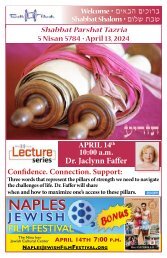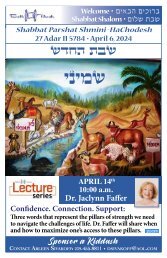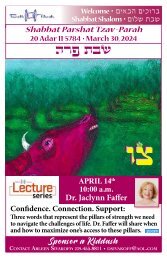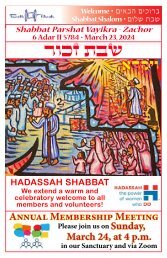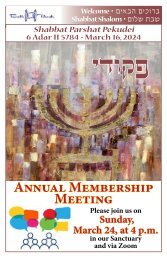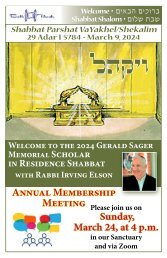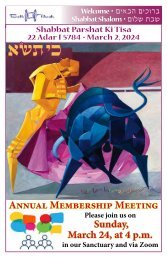You also want an ePaper? Increase the reach of your titles
YUMPU automatically turns print PDFs into web optimized ePapers that Google loves.
Welcome • ohtcv ohfurc<br />
Shabbat Shalom • ouka ,ca<br />
Parshat <strong>Balak</strong> – 10 Tamuz 5782 • July 9, 2022<br />
ekc<br />
Kiddush Sponsors<br />
We dedicate or Shabbat Kiddush<br />
Luncheon to our friends in<br />
Highland Park, IL and share the<br />
sorrow of the community following<br />
the harrowing events of July 4 th<br />
Kiddush Maven: Rosalee Bogo<br />
Assisted by: Mel Goldfine<br />
and Joe & Sue Hammerman<br />
To sponsor a kiddush, please contact Linda Scheinberg<br />
missus205@gmail.com<br />
Join Rabbi Chorny<br />
for his weekly discussion<br />
group, Tuesdays at<br />
12:15 p.m. via
Yahrtzeiten<br />
July 8 • Tamuz 9 Bertha Weiss – Grandmother of Mark Wasserman<br />
July 10 • Tamuz 11 Albert Barber – Father of Martin & Barry Barber<br />
Bill Morgan – Father of Jay Kaye<br />
July 11 • Tamuz 12 Haskell Nemeroff – Father of Judith Adelman<br />
Solomon Wasserman – Father of Mark Wasserman<br />
Bertha Hecht – Relative of Arnold Bresnick<br />
Lois Levin – Wife of Samuel Levin<br />
July 12 • Tamuz 13 Mason Kronick – Father of Carol Mest<br />
July 13 • Tamuz 14 Bernie Alpert – Husband of Fran Alpert<br />
Rabbi Chezi Zionce – Friend of The Sivakoffs<br />
July 15 • Tamuz 16 Helen Kramer – Mother of Nancy Garfinkel<br />
Birthdays<br />
July 8 Samuel Levin<br />
July 13 Ferne Walpert, Jeffrey Margolis<br />
July 14 Anne Rubenfeld<br />
July 15 Bruce Bier<br />
Torah & Haftarah Readings:<br />
Shabbat <strong>Balak</strong>: Numbers 22:3 9-25:9 (Etz Hayim p. 899)<br />
1. 22:39-23:5 2. 23:6-12 3. 23:13-26 4. 23:27-30<br />
5. 24:1-13 6. 24:14-25 7. 25:1-9 M. 25:7-9 (p. 908)<br />
Haftarah: Micah 5:6-6:8 (Etz Hayim p. 915)<br />
Torah / Haftarah Summary<br />
D'var Torah:<br />
There has never been another prophet in Israel like Moses<br />
– Rabbi Joel Levy<br />
The wandering Israelites repeatedly reach out to the local Middle-<br />
Eastern kingdoms to ask for safe passage through their lands and<br />
then defeat them in battle once those peace overtures have been<br />
rejected (the exception - their ignominious retreat from the Edomites in<br />
Numbers 20:21). By the time they reach the border with the Moabites<br />
the local tribes are thoroughly rattled. <strong>Balak</strong>, the king of Moab,<br />
realises that the Israelites cannot be defeated militarily and that<br />
maybe spiritual force could succeed where physical force cannot.<br />
He summons the most prestigious regional prophet, Bil'am, son of<br />
Be'or, to come and curse the Israelites for him.<br />
What follows is a highly unsettling series of encounters between<br />
Bil'am and <strong>Balak</strong>, recounted at great length in Parshat <strong>Balak</strong>. If we<br />
had previously thought that the Israelites had an exclusive line of<br />
communication with YHVH, creator of the universe, this parashah<br />
shatters that illusion. Bil'am seems to have a degree of intimacy and<br />
constancy in his relationship with God that we may not even see<br />
amongst our own prophets. He calls God by the intimate name,<br />
YHVH, that we might have thought was reserved for the exclusive
elationship between the Israelites and God; a name whispered<br />
to Moses at the burning bush. Each time that he is asked to come<br />
and curse the Israelites, Bil'am requests time to check in with God,<br />
receives clear guidance from YHVH and seems to follow it to<br />
the letter. Bil'am repeatedly and unswervingly says that he is not<br />
capable of casting powerful blessings or curses upon anyone, for he<br />
is merely a vehicle for transmitting God's will:<br />
"If <strong>Balak</strong> would give me his house full of silver and gold I cannot<br />
go beyond the word of YHVH my God, to do less or more" (22:18)<br />
"Have I now any power to say anything? The word that God puts in<br />
my mouth, that shall I speak!" (22:38)<br />
"How will I curse when God has not cursed?" (23:8)<br />
In his dealings with <strong>Balak</strong>, a local source of military and coercive<br />
political force, Bil'am seems direct and honest. In modern terms<br />
we might say that he has the courage to "talk truth to power".<br />
Despite repeated attempts at bribery and intimidation he sticks<br />
to his guns. In the end he emerges unscathed from the encounter,<br />
"returning to his place" (24:25).<br />
The midrash (Bemidbar Rabbah 14:19) acknowledges Bil'am's<br />
greatness. Basing itself on the final verses of the Torah that<br />
emphasise Moses' stature as a leader and prophet , "And there<br />
arose not a prophet since in Israel like Moses" (Deut. 34:10, a<br />
verse immortalised in the piyut "Yigdal Elohim Chai") the midrash adds, "...<br />
in Israel there arose not, but in the nations of the world he did arise,<br />
in order that the nations not be encouraged to open their mouths<br />
and say 'If only had we a prophet like Moses then we too would have<br />
become worshipers of the Holy Blessed One'. And who was their<br />
prophet 'like Moses'? Bil'am ben Be'or." The midrash goes on to<br />
analyse the differences between Moses' prophetic skills and Bil'am's<br />
and suggests that Bil'am exceeded Moses' prophetic capacities in<br />
three distinct areas, focussing on the constancy and predictability<br />
of Bil'am's line of communication with God, an idea that seems to<br />
emerge directly from the story in the parashah.<br />
What is the Torah teaching us here about who has access to<br />
knowledge of the will of Holy Blessed One? One of the consequences<br />
of being a monotheist is that you have to learn to share your God<br />
with everyone!<br />
D’var Haftarah:<br />
Life's Tightrope – Rabbi Ed Romm<br />
The prophets Isaiah and Micah were contemporaries, both living during<br />
the reign of Hezekiah, a period in which the Assyrian empire threatened<br />
the fate of the nation. In one of the prophecies in this week’s haftarah,<br />
Micah uses imagery found in a famous prophecy of Isaiah’s in a way
which seems to be a response to the latter’s message. A comparison of<br />
the two prophecies offers us a window into two theological approaches<br />
to the problems which confronted them and perhaps some insight into<br />
debates going on in the contemporary Jewish world as well.<br />
If there is one prophecy for which Isaiah is famous, it is this one: “The<br />
wolf shall dwell with the lamb, the leopard lie down with the kid, the<br />
calf, the beast of prey and the fating together, with a little boy to herd<br />
them.” (Isaiah 11:6) Isaiah, who was the older of the two, seems to have<br />
had an idyllic approach to the problems of his day. God would cause the<br />
animals of prey, namely Israel’s adversaries, to dwell in peace with their<br />
victims, Israel.<br />
Micah offers a contrasting picture: “The remnant of Jacob shall be among<br />
the nations, in the midst of the many peoples like a lion among beasts<br />
of the wild, like a fierce lion among flocks of sheep, which tramples<br />
wherever it goes and rends, with none to deliver.” (5:7) In this vision, the<br />
metaphors are reversed. Israel is identified with the lion and the flocks<br />
of sheep as Israel’s adversaries. In this prophecy, it is Israel who would<br />
bring about the redemption by overcoming its enemies.<br />
Rabbi Y. ben Nun and Rabbi B. Lau suggest that it is no coincidence<br />
that Micah chose the same metaphors as Isaiah. They note that Micah’s<br />
message was likely a challenge to Isaiah’s. Where Isaiah presumed that<br />
the world’s troubles would be healed by God, who would bring a utopian<br />
solution, Micah was pragmatic, asserting that problems were to be<br />
resolved on the ground in a realistic fashion. (Yishayahu, pp. 301-2)<br />
The conflict between these two approaches is just as apparent today as<br />
it was then. There is a presumption among some that idyllic solutions<br />
to problems exist and that they will miraculously cure Israel’s or the<br />
world’s troubles. Blink an eye and utopia will appear just like that. If<br />
the suggested interpretation is right, Micah is challenging this idea.<br />
The solution to problematic situations is a difficult and arduous process<br />
which people must make happen without abdicating responsibility<br />
and without the expectation that miracles come without toil. Micah’s<br />
message is a good reminder that miraculous messianism in all of its<br />
ideological permutations may ultimately be an impediment rather than<br />
a booster to a better world.<br />
“...rautn vhfnu`u vc ohehzjnk thv ohhj Jg”<br />
“She is a tree of life to those who embrace her;<br />
Remember<br />
those who<br />
Lunch-N-Learn<br />
hold her tight are happy…”<br />
with<br />
Rabbi Chorny Tuesdays at 12:15 P.M.<br />
Dedicate new leaves in commemoration of<br />
life’s joys & celebrations<br />
Please contact Linda Scheinberg: MISSUS205@GMAIL.COM or<br />
Harvey Rosenthal: HAROSENTHAL80@GMAIL.COM<br />
Beth Tikvah of Naples<br />
1459 Pine Ridge Road<br />
Naples, FL 34109<br />
(239) 434-1818<br />
Visit us online at<br />
bethtikvahnaples.org<br />
or scan the QR code<br />
to go there directly




